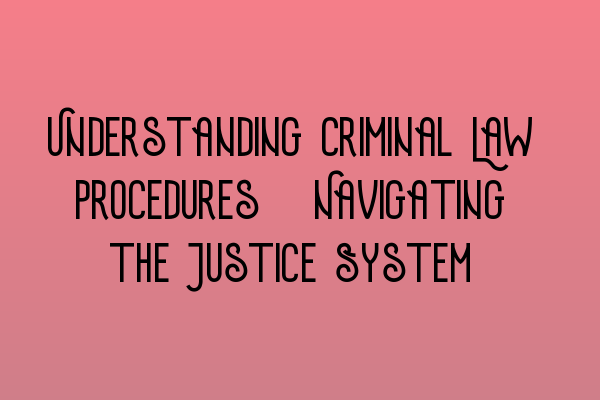Understanding Criminal Law Procedures: Navigating the Justice System
In the world of law and order, criminal law procedures play a critical role in ensuring a fair and just society. Navigating the complexities of the justice system can seem like a daunting task, but with the right knowledge and guidance, you can successfully navigate through the process. This blog post aims to provide you with a comprehensive understanding of criminal law procedures in the UK, shedding light on key aspects and offering practical tips for a smooth journey. So, let’s dive in!
1. Arrest and Detention:
The first step in the criminal law procedure is the arrest and detention of a suspect. When the police have reasonable grounds to believe that an individual has committed an offense, they can arrest and detain the person for further investigation. During the arrest, the police must inform the suspect of their rights and provide them with an opportunity to seek legal representation. If you or someone you know is facing arrest or detention, it is essential to consult with a solicitor who specializes in criminal law, like SQE Criminal Law & Practice Law UK.
2. Bail and Remand:
After the arrest, the suspect may be granted bail or kept on remand. Bail allows the suspect to be released from custody until their court appearance, while remand involves keeping the suspect in custody until the trial. The decision on whether to grant bail or impose remand is based on various factors such as the seriousness of the offense, the risk of the suspect committing further offenses, and the likelihood of the suspect fleeing. Seeking legal advice from an experienced solicitor can greatly assist in presenting a strong case for bail if the circumstances permit.
3. Pre-trial Proceedings:
Once the suspect has been charged with an offense, pre-trial proceedings begin. This includes initial hearings, such as the first appearance at the Magistrates’ Court, where the charges are read out, and the accused enters their plea. At this stage, it is crucial to engage a solicitor who is well-versed in criminal law procedures to provide expert advice and prepare a robust defense strategy. They will guide you through the formalities, help gather evidence, and advocate for your rights throughout the process.
4. Case Preparation:
Effective case preparation is vital for building a strong defense. This involves gathering evidence, interviewing witnesses, and preparing legal arguments to challenge the prosecution’s case. Working closely with a solicitor who specializes in criminal law is imperative to ensure all aspects of the case are thoroughly examined. They can assess the evidence against you, identify any weaknesses, and devise a compelling defense strategy to protect your rights and secure the best possible outcome.
5. Trial and Sentencing:
If your case proceeds to trial, it will be heard by a judge and, in some cases, a jury. The prosecution will present its evidence, and you and your solicitor will have the opportunity to challenge it and present your own evidence and witnesses. Your solicitor will guide you through the trial process, ensuring your rights are protected and your defense is presented effectively. If found guilty, the next stage is sentencing, where the judge considers various factors, such as the seriousness of the offense, the defendant’s background, and any mitigating circumstances. A skilled solicitor can present favorable arguments to minimize the potential penalties.
6. Appeals and Post-Trial Remedies:
In some cases, it may be necessary to appeal against a conviction or the severity of the sentence. Appeals are complex legal procedures that require meticulous attention to detail. Engaging an experienced solicitor who is familiar with the appeals process can greatly enhance your chances of a successful outcome. They will review the trial proceedings, identify potential grounds for appeal, and present persuasive arguments to the higher courts for reconsideration.
Navigating the criminal law procedures can be a challenging task, but with the support of a knowledgeable solicitor and a solid understanding of the justice system, you can effectively navigate through it. If you find yourself facing criminal charges, it is imperative to seek legal representation at the earliest opportunity to ensure your rights are protected and to receive expert advice tailored to your specific circumstances.
For more information on criminal law procedures and legal representation in the UK, you may find the following articles helpful:
– Legal Representation for Delaware LLCs in the UK: Expert Advice
– Legal Challenges for UK Businesses in the U.S.: Strategies for Overcoming Hurdles
– SQE Exam Prep: Essential Study Materials for Aspiring Solicitors
– Expert Testimonies in UK Courts: Building Strong Cases
Remember, the justice system is designed to ensure fairness and uphold the rule of law. By understanding the criminal law procedures and seeking professional legal guidance, you can navigate through the system confidently and protect your rights.
